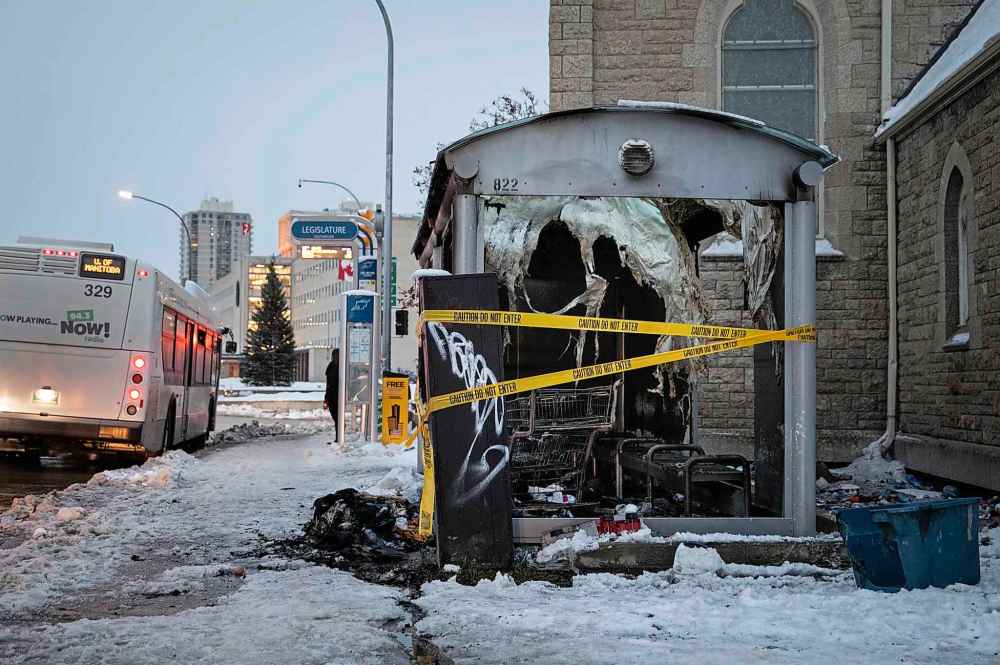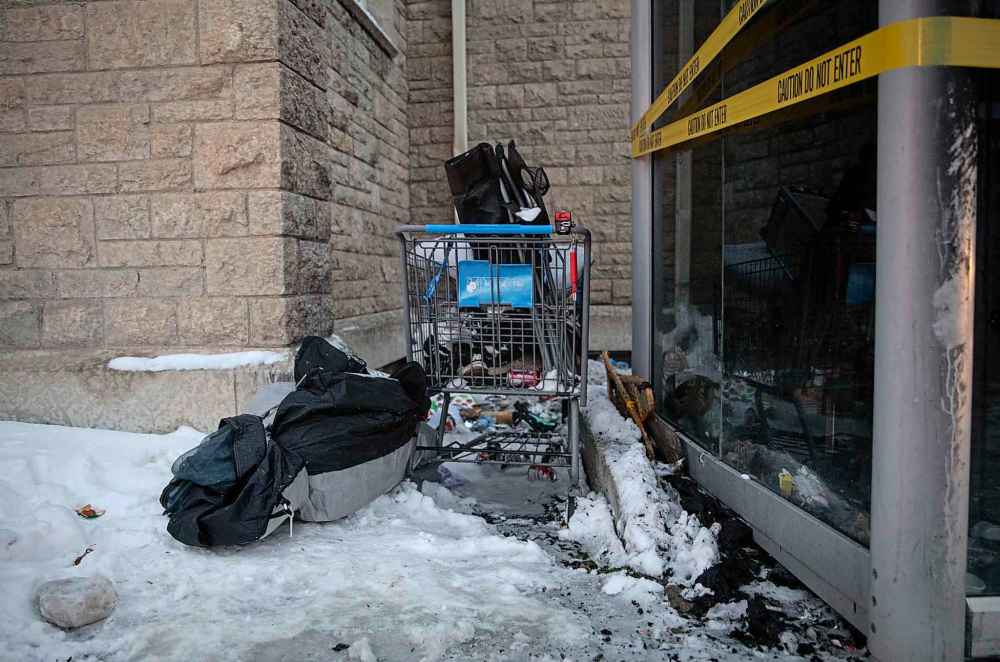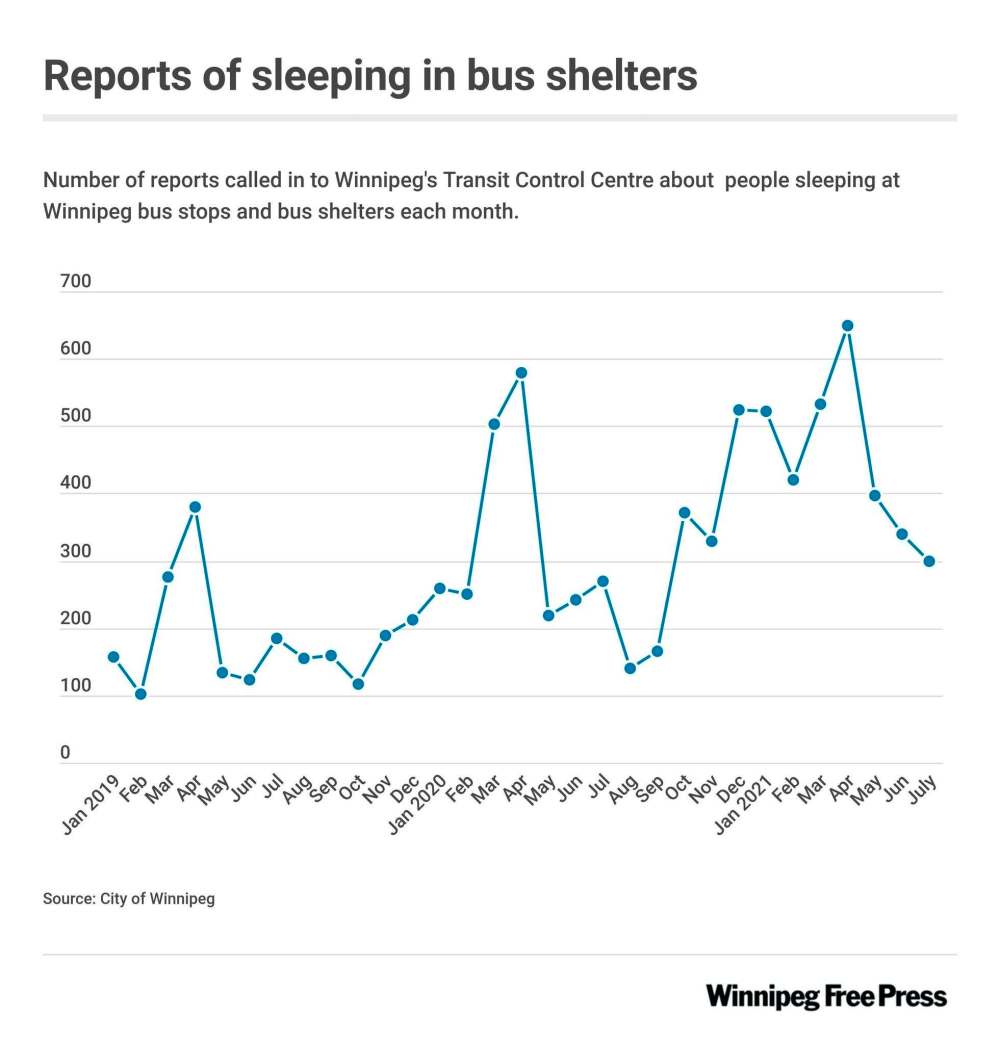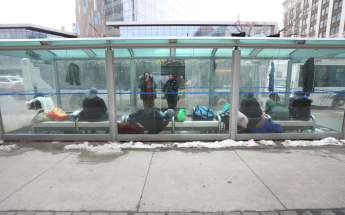Pandemic brings ‘hidden homelessness’ into public view Housing shortfalls leave bus shelters inundated
Read this article for free:
or
Already have an account? Log in here »
To continue reading, please subscribe:
Monthly Digital Subscription
$19 $0 for the first 4 weeks*
- Enjoy unlimited reading on winnipegfreepress.com
- Read the E-Edition, our digital replica newspaper
- Access News Break, our award-winning app
- Play interactive puzzles
*No charge for four weeks then billed as $19 plus GST every four weeks. Offer only available to new and qualified returning subscribers. Cancel any time.
Read unlimited articles for free today:
or
Already have an account? Log in here »
Hey there, time traveller!
This article was published 14/11/2021 (1136 days ago), so information in it may no longer be current.
The number of vulnerable Winnipeggers found sleeping in bus shelters continues to soar, even as outreach workers try to find them better housing.
In every month between January and July 2021, there were more reports of people sleeping at bus stops or shelters than during the same month in each of the previous two years, according to Winnipeg Transit data.
During the first seven months of 2020, there were 2,322 reports, which jumped to 3,160 during the same period this year.
That increase has cast a spotlight on the severe lack of affordable housing, according to an advocate working to combat homelessness.
“Obviously, the main reason people are sleeping in bus shelters is because of the housing crisis … We’re going to see increased numbers of people sleeping anywhere that they can if we don’t have adequate housing supply,” said Kris Clemens, communications manager for End Homelessness Winnipeg.
Clemens said the city now has 709 fewer low-income housing units than it did in 2019, but needs 300 more units every year to address current needs.

Clemens said homelessness has become far more visible during the pandemic, a trend resulting not only from job and housing losses. She said many Winnipeggers also stopped sharing their homes with vulnerable people when public health orders restricted or prohibited visitors, a trend that brought “hidden homelessness” into public view.
“People can no longer rely on informal house-guest type of arrangements … that would have been (available) before the pandemic,” said Clemens.
“People can no longer rely on informal house-guest type of arrangements … that would have been (available) before the pandemic.” – Kris Clemens, communications manager for End Homelessness Winnipeg
Winnipeg’s strategy to address homelessness has also shifted. Rather than ordering people to move away from transit shelters, the city reports concerns to community organizations, such as Main Street Project, St. Boniface Street Links and the Downtown Community Safety Partnership, so their staff can try to connect vulnerable individuals with shelter and other resources.
There are currently 550 shelter spaces in Winnipeg, with 300 spots in three main adult shelters, which people can be referred to. However, individuals in need may refuse those options, said Clemens.
“(If) they may feel safer and more comfortable in the bus shelter, then the outreach is not going to force them to relocate. That makes these numbers of people potentially higher and certainly more visible to the public,” she said.
Clemens said the use of bus shelters as a relatively warm place to sleep may increase as cold weather continues.
“(If) they may feel safer and more comfortable in the bus shelter, then the outreach is not going to force them to relocate. That makes these numbers of people potentially higher and certainly more visible to the public.” – Kris Clemens
In an email, Winnipeg Transit confirmed bus drivers who notice someone sleeping in a bus shelter are trained to call Transit’s control centre to report it. Following that, inspectors or emergency personal can respond.
“Transit inspectors who come across people inhabiting bus shelters assess the situation, provide information about emergency shelters that are open, and engage emergency responders if necessary to ensure safety,” said spokesperson Megan Benedictson.
Unfortunately, it may be tough for the public to notice each time an outreach process successfully connects someone in need with stable housing, said Coun. Sherri Rollins, chairperson of council’s protection and community services committee.
“It’s almost continuous, where they can meet needs of folks that are in Transit shelters, only to then find the Transit shelter, the same one, filled up (with new people),” said Rollins.

The councillor stressed that occurs because the city has a critical need for affordable housing, something she believes the province must devote new funding to address.
Clemens said the use of bus shacks by unsheltered Winnipeggers sometimes triggers complaints about garbage, food and even discarded needles being left behind. She noted homeless individuals are at higher risk of mental health and substance-use issues but stressed homelessness must not be minimized as an “unsightly blight” to move off public property.
“These are human beings. These are our neighbours. These are people facing an incredibly stressful dehumanizing and heavily stigmatized life experience and they’re just trying to cope as best they can,” she said.
joyanne.pursaga@freepress.mb.ca
Twitter: @joyanne_pursaga

Joyanne Pursaga
Reporter
Born and raised in Winnipeg, Joyanne loves to tell the stories of this city, especially when politics is involved. Joyanne became the city hall reporter for the Winnipeg Free Press in early 2020.
Our newsroom depends on a growing audience of readers to power our journalism. If you are not a paid reader, please consider becoming a subscriber.
Our newsroom depends on its audience of readers to power our journalism. Thank you for your support.
History
Updated on Tuesday, November 16, 2021 10:41 AM CST: Adds fresh art









